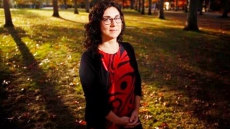WINNIPEG — After three decades being known as one of Canada's top UFO experts, Chris Rutkowski doesn't mind a bit of good-natured ribbing now and then.
"People will sometimes give me Marvin the Martian toys for Christmas," says Rutkowski, who researches unidentified flying objects in his off time from his day job as a University of Manitoba's communications co-ordinator.
Rutkowski, who is with Winnipeg-based Ufology Research, has long been fascinated by reports of mysterious lights and unusual objects in the sky that defy easy explanation.
"There is a real phenomenon I think is worth scientific study," he says.
"It's something I think people should be talking about. It's a wonderful way to think of the universe, our place in the universe."
His interest was first sparked in the 1970s when he was studying astronomy and calls came in about UFO sightings.
"My colleagues in astronomy were simply not interested. They thought it was simply pointless, or hallucinations, or people were just seeing things, spots before their eyes.
"I was curious what people were actually seeing and experiencing so I took the calls."
Eventually Rutkowski, 57, came to be considered "Canada's UFO guy," giving lectures and penning several books about the phenomenon.
He says there are more than 1,000 UFO reports in Canada a year.
He figures about 95 per cent of the sightings he investigates can be explained. The strange objects often turn out to be airplanes, satellites, fireballs or — more recently — drones.
For the rest, there's nothing to suggest that otherworldly visitors are responsible — as tempting an explanation as that may be for some.
"There's no incontrovertible evidence that aliens are visiting us, although it's a wonderful theory."
Lately, Rutkowski has been hearing more reports from people claiming they've been in contact with aliens.
"There's no proof of that and it's very, very prevalent that people are believing things that seem very, very far-fetched."
Rutkowski says those sorts of claims tend to spike during tumultuous times in world history — amid mounting Cold War anxieties in the 1950s, for instance.

"The world seems so overwhelming and life seems so impossible. People are worried about what will happen in their lives ... (so) they're looking for creatures from elsewhere to come and save them," he says.
"That's wonderful wishful thinking, but it's not really helping the scientific analysis of this phenomenon."
Rutkowski's current work delves into historical UFO sightings. He's been digging into government, police and military documents from the last half century.
The 50th anniversary is coming up next year for two of the best-known unexplained Canadian cases: accounts of an unusual, lit-up object crashing into the water off Shag Harbour, N.S., and a prospector who suffered burns during a reported encounter with mysterious discs in Falcon Lake, Man.
Most UFO reports come from big population centres, but a statistically disproportionate amount tend to come from the North and the Maritimes.
Rutkowski doesn't know why that is — perhaps an avenue for future research.
He says the snapshot it provides of society is almost as fascinating as the UFO phenomenon itself.
"If there isn't a physical phenomenon, there's at the very least a psychological or a sociological phenomenon, and in any of those cases, science really should be taking a closer look at the UFOs."
CANADIAN SCIENTISTS' CLAIM OF EXTRA-TERRESTRIAL LIFE SPARKS INTEREST
The science community is keeping a wary eye on a Canadian research team's claim of finding possible homes for life in outer space.
The researchers from Universite Laval in Quebec City say analysis of some unusual signals has helped them identify 234 potential systems that might be playing host to extra-terrestrial intelligence (ETI).
The theory has evolved over several years and took root when lead researcher Ermanno Borra published a paper in 2012 speculating on how residents of other galaxies may try to broadcast their existence to the rest of space.
He published a theory that such life forms could use lasers to make their home planet emit an unusual signal that would be noticed by anyone carefully observing the cosmos.
Now, Borra and graduate student Eric Trottier say they've identified 234 stars emitting that exact signal, adding they all appear to have characteristics that would enable them to help sustain life.
Fellow academics are intrigued enough by the research to study the findings more closely, but are currently treating the findings with skepticism and saying it's too early to make definite claims.
Borra agrees, saying the latest findings — which have been published to a repository of scientific papers and are awaiting peer review — are far from conclusive.
"The kind of signal we found is in agreement with the ETI hypothesis, but right now it's still a hypothesis that must be confirmed with further work," Borra said in a telephone interview from Quebec City.
The signal at the heart of the theory involves lasers, which Borra said are a simple form of technology to produce and would be well within the capabilities of civilizations that are potentially much more advanced than humankind.
Borra theorized that sending flashes of light millionths of a second apart would be an easy feat that could produce a dramatic result — altering the unique light spectrum produced by an individual star.
Earth-bound scientists have already dedicated vast resources to charting the spectra of planets, stars and other bodies in various galaxies and collecting the information in central databases.
For their research, Borra and Trottier turned to the Slone Digital Sky Survey, a 16-year project that has purportedly mapped more than 30 per cent of the sky and catalogued spectra for at least 2.5 million astronomical objects.
Borra said they compared the theoretical spectrum that would be produced by laser flashes to the survey results and found only 234 matches.
Borra said the stars in question all share spectral characteristics with the sun, which itself is too hot to support life forms. The stars he's identified are therefore more likely to be the centres of prospective stellar systems in which other life-sustaining planets could exist, he added.
"We intuitively expect that an ETI would be in a planet that turns around a star like the sun at about the same distance as the Earth from the Sun," he said. "This is because this environment would be the best for life to exist. The proof comes from the fact that life exists on Earth."
Borra said he accounted for the fact that the spectra might be caused by factors other than ETI, such as chemical makeup or calculation errors, but said the research suggests such factors are not at play.
Academics at the University of California, Berkeley, however, aren't so quick to dismiss such causes.
The university's Breakthrough Listen project has announced it will be studying the results more closely, but currently doesn't place much stock in the findings as a sign of life beyond Earth.
Scientists dedicated to searching for extra-terrestrial intelligence have developed the Rio scale to assess the likelihood that anomalies are a sign of alien life. UC Berkeley currently give the Canadian findings a 0 or 1 on the Rio scale, classifying them as "insignificant."
"The one in 10,000 objects with unusual spectra seen by Borra and Trottier are certainly worthy of additional study," the university said in a statement. "However, extraordinary claims require extraordinary evidence. It is too early to unequivocally attribute these purported signals to the activities of extraterrestrial civilizations."
Borra said the Berkeley researchers will try to reproduce the results with their own telescopes, adding he welcomes the additional scrutiny and potential confirmation from outside sources.
"I do not know myself what this really is," he said. "More work has to be done to confirm it.



